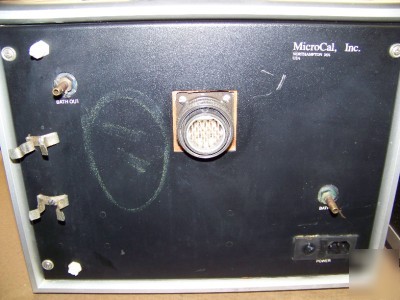Chicago Industrial Reuse and Parts Blog-Newsgroup > West Chicago
> Micro calorimetry system + isothermal titration mcs-itc
Micro calorimetry system + isothermal titration mcs-itc
Micro Calorimetry System + Isothermal Titration MCS-ITC
Micro Calorimetry System with Isothermal Titration Calorimetric Unit MCS-ITC Information:
The MCS-ITC is a micro-calorimetry system equipped with an isothermal titration unit, which allows ultrasensitive characterization of the thermodynamics of a reaction in solution by using the Isothermal Titration Calorimetry (ITC) technology. ITC is a thermodynamic technique that allows the study of interactions between molecules by measuring the heat released or absorbed by interacting molecules, which is proportional to the amount of binding occurring. From these measurements thermodynamic characteristics, binding constants (~103 108 M-1), and reaction stoichiometry can be determined. Since the heat of binding is a naturally occurring event, ITC technology does not require immobilization and/or modification of the reactants.
* To study any type of reactions including antigen-antibody, DNA-drug, receptor-target, protein-ligand, and protein-protein, among others.
* To determine reaction stoichiometry.
* To measure binding constants.
* To obtain thermodynamic properties of binding such as enthalpy, entropy and Gibbs free energy.
* Samples may be recovered following a titration.
* Sample and reference cells are not removable; access for filling and cleaning is at the top of the ITC unit.
* The MCS-ITC does not have a molecular weight cut off.
* With the MCS-ITC, the run time is approximately 2 hours per titration.
* Data generated at the MCS Control Unit is displayed in real time.
* Normal operating temperature: 0 C 80 C
* Sample (macromolecules) cell and reference cell volumes: ~ 1.4 mL
* Typical macromolecule concentrations required (depending on magnitude of binding constant): 20 mM 1 mM.
* Titration syringe (ligand): total volume of 50 mL, 100 mL and 250 mL available; injection volumes typically 5-10mL.
* Typical ligand concentrations required: 10- 50 times the macromolecule concentration, depending on syringe size used.
* Sample solutions with undissolved solutes or solid materials must be filtered before running the sample.
* The pH of ligand and macromolecule solutions should not differ by more than 0.05 pH units.
* Concentrations of the solutions should be accurately determined after final preparation.
* Strong acids are not be used in the ITC.
* DTT should be avoided as a disulfide reagent and replaced by b-mercaptoethanol or TCEP.
* All sample solutions must be degassed before running the experiment.

